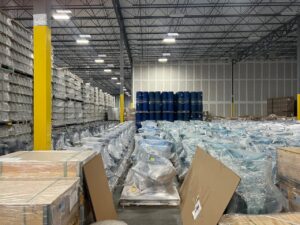
A crucial aspect of operational finance in many industries is understanding how to calculate and distribute freight cost per unit. Freight costs can significantly impact a company’s overall profitability, especially for those where shipping is a significant part of their operations.
This comprehensive guide aims to elucidate this complex subject matter and guide businesses toward better freight cost management. You can check out our freight information or contact us today.
Grasping the Basics: Freight Costs
Freight costs constitute the expenses involved in transporting goods from their origin to the destination.
This cost is not limited to mere transport expenses but can also encompass various other charges. These can include insurance fees, customs duties, or even documentation fees. Factors influencing these costs are the destination, the total weight of the shipment, the number of pallets, and the freight class.
Manufacturers like Vulcan Wire, specializing in baling wire and cargo securement products, meticulously manage freight costs to maximize efficiency and profitability.
Operating from our locations in California and the greater Phoenix area Vulcan Wire leverages its location and vast distribution network for optimal freight rates.
Delving Deeper: Calculating Freight Cost Per Unit
Freight cost per unit essentially breaks down the total freight cost over the total number of units in the shipment.
This calculation is of paramount importance because it facilitates more accurate financial projections, allows for informed pricing strategies, and helps maintain competitive prices while protecting profit margins.
Calculation of freight cost per unit involves two fundamental steps:
- Data Collection: Gather all pertinent data, primarily total freight cost and the total number of units in the shipment.
- Performing the Calculation: Divide the total freight cost by the total number of units to get the freight cost per unit.
The Impact of Freight Costs on Pricing Strategy
A company’s pricing strategy can benefit significantly from understanding the freight cost per unit. It informs the business on how to distribute costs across various product lines. Vulcan Wire, for example, uses this information to set prices for our diverse product range.
By considering factors such as weight and freight class, we effectively balance costs and maintain competitive pricing.
Regular Re-evaluation: Why It Matters
Freight costs are not static. Factors like fuel prices, customs duties, and transportation rates often fluctuate, impacting the overall freight cost. Therefore, regular reassessment of the freight cost per unit is essential to maintain competitive pricing and ensure the company’s pricing strategy remains viable.
Enhancing Logistics Efficiency: A Key to Cost Reduction
Improving logistics efficiency is one of the most effective ways to reduce overall freight costs. Centralizing manufacturing and distribution points, and selecting the most efficient shipping methods and routes are practices that companies like Vulcan Wire use to optimize freight costs.
Vulcan Wire also capitalizes on our strategically located warehouses in Los Angeles, CA, and Phoenix, AZ, ensuring the most convenient delivery and the best rates to various locations. Their understanding and execution of logistic efficiency serve as an excellent example for businesses aiming to optimize their freight costs.
Sea Freight Considerations
Businesses relying on sea freight must choose between Full Container Load (FCL) and Less than Container Load (LCL). The choice can significantly impact the freight cost per unit.
Each option has its advantages and disadvantages in terms of cost, security, and convenience, necessitating a careful evaluation based on the specific needs of the business.
Conclusion
Understanding and accurately calculating freight cost per unit is an effective strategy for managing expenses, maximizing profitability, and maintaining a competitive edge. Regular reassessment and constant optimization of logistics can result in significant cost savings.
The case of Vulcan Wire serves as a testament to the potential benefits these practices can bring to businesses of varying sizes.
By implementing these practices, your business can ensure its financial health and deliver added value to your customers, thereby establishing a robust and successful shipping strategy.
A balanced approach to managing freight costs can yield great dividends in the form of customer satisfaction and enhanced business reputation.
Learn more about our personalized freight service here.





















